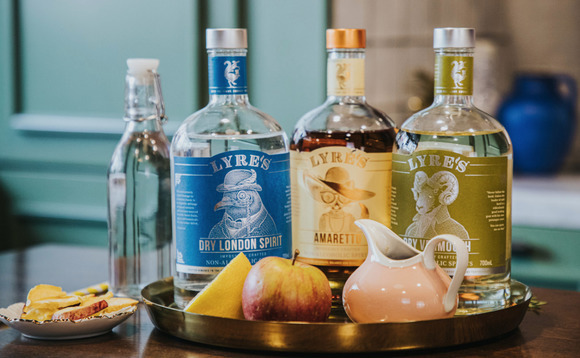
Deal focus: Lyre's opts for science instead of a still

Australia-founded beverages maker Lyre’s has raised $11.5 million in seed funding with a view to helping non-alcoholic spirits follow in the footsteps of alternative protein
Asked to explain the dynamics behind rising demand for beverages that look and taste like alcohol but contain no alcohol, Mark Livings, co-founder of Lyre's Non-Alcoholic Spirits, points to several health and wellness analogues. Plant-based replacements for milk and protein are most relevant.
Milk because the rise of plant-based equivalents plots a course that Livings believes the non-alcoholic spirits will follow. A decade ago, plant-based milk accounted for about 1% of all milk consumed in English-speaking countries, much like where non-alcoholic spirits are now. Penetration of plant-based milk has since risen to the mid-teens.
The relevance of protein replacements is in the nature of production. Impossible and Beyond broke down ground beef into its elemental compounds, identifying what contributes to the different flavors. Lyre's did the same: its Aperitif Rosso was created by mapping out the essences and extracts of sweet vermouth and replicating them using natural sources.
"For companies focused on protein replacement, the mouth feel, umami and unctuousness are all considerations. We wrestle with the same things when replicating ethanol on the pallet. It's been a real triumph of science to deliver to the quality we are at," says Livings.
Lyre's was established by Livings, who previously ran a marketing services agency for consumer-packaged goods multinationals, and Carl Hartmann, a serial entrepreneur. They wanted to launch a consumer product line in the fashion of a start-up: a small and skilled entrepreneurial team; the aggressive pursuit of scale; revenue prioritized over profitability in the initial stages. Having identified non-alcoholic spirits as a gap in the market, they spent three years devising a product.
Lyre's has developed a range of 13 alcohol-free classic spirits – gin and tonic, bourbon malt, and Aperol spritz, among others – that have won multiple industry awards. The company recently raised $11.5 billion in seed funding from several European and North American venture capital firms – such as VRD Investment, Doehler Ventures, DLF Venture and Maropost Ventures – as well as a smattering of family offices and high net worth individuals.
While Lyre's was founded in Australia and launched its first product there in July 2019, it is domiciled in the UK. There are three reasons for this. First, Livings believes it is "incredibly difficult, if not impossible" for a consumer goods start-up to get traction with Australian VCs. Second, the company was designed as a global business. Third, the UK is the epicenter of the non-alcoholic spirits industry.
The most common approach is to make a traditional spirit and remove the alcohol, which is achieved through boiling, spinning it in a centrifuge, or using a pneumatic ram to push it out through a membrane. Gin is the go-to product because without ethanol it is difficult to replicate barrel-ageing characteristics. Seedlip and Ceder's, owned by Diageo and Pernod Ricard, respectively, are both gins.
The problem with ethanol-less spirits is a loss of flavor. "You end up with an insipid and watery beverage that is not really what you are looking for as a consumer," Livings says. He notes that food science-based approach not only delivers a better-quality, more varied product, it is also easier to scale. Output is not limited by the size of a still. Lyre's produces its herbs and spices in a central location then ships them to target markets where local partners complete the process.
The company's products are available in 20 international markets – including Hong Kong, Singapore, and mainland China – and the goal is to reach 30 by the first quarter of next year. Once that is achieved, the focus will switch to scaling up within these markets. Unlike protein replacements, Livings doesn't believe it will have to overcome a psychological barrier to gain traction.
"The concept of a non-alcoholic beverage has been around for a long time. Consumers are so ready for this category. They are already looking for it in supermarkets, online and in bars," he says. "Once the category reaches critical mass there will be an orgy of M&A activity and eventually it will settle down and there will be consolidation."
Latest News
Asian GPs slow implementation of ESG policies - survey
Asia-based private equity firms are assigning more dedicated resources to environment, social, and governance (ESG) programmes, but policy changes have slowed in the past 12 months, in part due to concerns raised internally and by LPs, according to a...
Singapore fintech start-up LXA gets $10m seed round
New Enterprise Associates (NEA) has led a USD 10m seed round for Singapore’s LXA, a financial technology start-up launched by a former Asia senior executive at The Blackstone Group.
India's InCred announces $60m round, claims unicorn status
Indian non-bank lender InCred Financial Services said it has received INR 5bn (USD 60m) at a valuation of at least USD 1bn from unnamed investors including “a global private equity fund.”
Insight leads $50m round for Australia's Roller
Insight Partners has led a USD 50m round for Australia’s Roller, a venue management software provider specializing in family fun parks.







